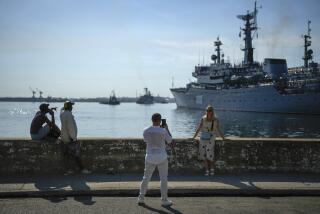Turnabout in Cuba
- Share via
Fidel Castro is going all out to make this week’s visit to Cuba by Soviet President Mikhail S. Gorbachev look like an upbeat meeting between friends and allies. But no amount of positive public statements can hide the differences between the rigid Marxism that Castro imposed on his people and Gorbachev’s more open style of Communism.
The dissonance between appearances and reality began with Gorbachev’s arrival at Havana’s airport Sunday. An estimated half million people turned out to greet the Soviet leader, about a quarter of the capital’s population. To some extent, the large crowds reflect genuine Cuban gratitude for the more than $5 billion a year in economic aid that the Soviet Union provides to Castro. But the crowds also reflect how disciplined Cuba’s Communists are. They have neighborhood defense committees in every community on the island, and can turn people out when necessary.
Many Cubans in the crowds also are undoubtedly curious about this new Soviet leader. While the official Cuban media have limited the amount of information people on the island get about Gorbachev’s efforts at glasnost and reform, many Cubans are aware that something unusual is afoot in the Soviet Union, and they certainly know that Castro is not very happy about it. On several recent occasions the Cuban dictator has publicly voiced his disapproval of Gorbachev’s campaign of perestroika to restructure the Soviet economy, warning audiences against the danger of using “capitalist mechanisms to build socialism.” To emphasize his own Marxist-Leninist orthodoxy, Castro has even abandoned minimal economic reforms and other openings recently attempted in Cuba, calling for a campaign of “rectification.”
Gorbachev’s challenge in Cuba is to try to get Castro to change his ways without angering a notoriously volatile ally. Cuba is a drain on the Soviet Union, so Gorbachev wants Castro to run things more efficiently, if only for the sake of economy. But Cuba is the Soviet Union’s chief outpost in the Western Hemisphere, and that gives Castro important leverage in dealing with Gorbachev. The interplay between two such strong and highly visible personalities will be intriguing to watch. And, if nothing else, there is historic irony in the reversal of roles being played during the first visit to Cuba by a Soviet leader in 15 years. Fidel Castro built his international reputation playing the young, firebrand revolutionary who was willing to challenge orthodox old men in the Kremlin. Now Castro is the rigid older man having to deal with a maverick from Moscow.
More to Read
Sign up for Essential California
The most important California stories and recommendations in your inbox every morning.
You may occasionally receive promotional content from the Los Angeles Times.













